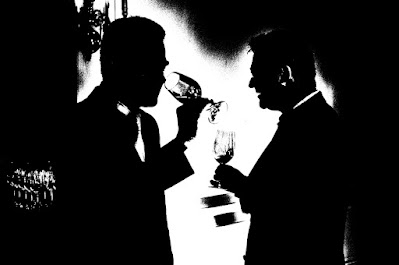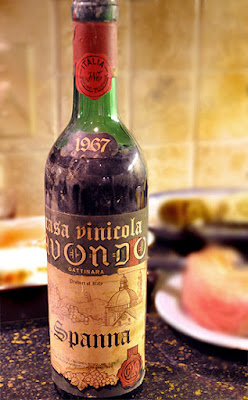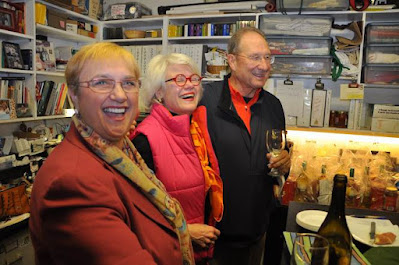I don’t know how it happened, but recently I was talking to an acquaintance who never knew what I did in my career. I mentioned something about being a wine guy, with a particular focus on Italian wine. Right after I said the word “Italian” I noticed a facial micro-expression on the person I was chatting with. It was as if to indicate, “What? No Californian? No French? WTF?”
It was then I realized I should tell a different story. Yes, I was, and am, into Italian wine, deeply. But not to the exclusion of other great wines of the world. That was a lesson I learned from French wine snobs in the 1970-s and 1980’s. You know, those astute ones (usually white, usually male, usually professionals, lawyers, doctors, professors) who think the world begins and ends with Francophilia.
 |
| Pierrette et Ange @ Chateau Croix d'Allons |
Hey, I like French things. I love Paris, love the French countryside even more. especially the winegrowers. I just didn’t realize just how much French wines were embedded inside my memory banks.
A recent example:
I’m having a birthday dinner at a French restaurant with a friend who just turned LXVI. And he handed me the wine list. “Pick a white to start with.” Ok, no problem. So, I perused the pages and found a Bandol Blanc from Chateau Croix D'Allons that looked nice. And fresh. The server brought it, opened it and poured, and in a most professional manner.Along with the wine we were enjoying Coquilles Saint-Jacques aux Tomates et Basilic. I was thinking how well the wine went with it and wondered, aloud, what the grapes were. I blurted out, “I bet this wine is a blend of Clairette and Ugni Blanc.” It was almost Tourette-like, my little Gallic outburst. My companion, said nothing, content to munch contentedly on his scallops.
But then, curiosity got the better of me, and I wondered if perhaps the back of the bottle might have some information as to the cepage of the wine. And sure enough, it was a blend of 60% Clairette and 40% Ugni Blanc!
How in hell did I remember something as arcane as that, but I cannot remember where I put my phone, or what I had for dinner the night before? Such a mystery the human mind is.
Nonetheless, I felt some satisfaction in knowing something that abstruse. I mean, for an Italian wine guy.
Then I realized something. It was a lesson I learned from a very fussy, very snooty French sommelier, not long after Chicxulub slammed into the Gulf of Mexico.
This very Gallic wine steward, Philippe, was tall, with an imposing proboscis and elongated temples, upbraided me when I was on a sales call. Oh, I was selling French wine, California wine, Italian wine, any wine then. But then, jetteI attempted to sell Italian wine to a French restaurant.
“No, no, no, jeune lion, NEVER, NEVER, EVER show me Italian wines! We are a French establishment! We have higher standards, something you would be wise to learn, NOW!” and he turned on his heels, made a sharp click with them, and jetéd into the kitchen. I, meanwhile was left there, at the empty bar, hat in hand, with an order for 1 case of 1966 Chateau Margaux. And I slithered out the door, unheard, unseen and chastened.
What had I done wrong, I asked myself? After all, when I was working in Italian restaurants, we had French wines on the list too. Was not turn-around fair play? Apparently not, in the mind of a French sommelier forty years ago.
But then, it was in a time, when Italian wines hadn’t quite arrivée yet. The whites were still inconsistent and unexciting. Many of the reds were rustic and unfamiliar. The sommelier attuned me to setting myself to higher standards, albeit unwittingly. Game on!
I studied French wine. It came easily enough, for the wines were well made and delicious. I had no complaint with them. But I didn’t see Italian wine, as they were rapidly evolving in the marketplace, as inferior or of a lower marque. They were different, made for the foods that they’d evolved through the ages with. Yes, they were confusing. Yes, they were diverse to the point of distraction. But they were also sexy and delicious and approachable, both from a taste perspective and a fiscal one.
But, the discipline of learning about French wine - tasting, tasting, tasting - and applying what I learned to my world, opened me up to a universe which was uncharted. I learned to correlate. Oh, you want something like a Bordeaux for your Italian steak house? Let’s try some Super Tuscans. Maybe a Brunello. Oh, you need a fancy white Italian wine to go with truffles in October? Let’s try maybe a Gavi, or maybe a Verdicchio from Matelica. Maybe a rich, ripe Chardonnay from Sicily? I had to build bridges, so folks could cross over. No one wanted to walk a plank, they wanted to get there, but with minimal risk. I got that.
Along with knowing French wine better, I was able to show folks I wasn’t a snob. The snotty French sommelier taught me a few things, and at the top of the list was that I did not want to broadcast snobbery. We weren’t going to get folks onboard by being haughty and exclusionary. Yeah, that might work in the auction houses in the 80’s, but on the streets, folks wanted easy entry. And with the boom in the Mediterranean diet consciousness in America, there were all kinds of iterations in restaurants, and in magazines, that showed Italian-like food. And, voila, Italian wine dovetailed into that scenario quite handily. But it’s like when you’re working a room. You have to know who you’re talking to, what their objections are, and their limitations. So, you can open them up to opportunities that aren’t foreign to them. Something, again, the French sommelier didn’t learn, didn’t need to learn.
But that was before the Italian asteroid hit Planet Food. And everything changed.
So, now what? Do we just take it for granted that all things Italian have always been here and always will be? Well, if we do, we risk becoming extinct just like Philippe.
I mean, it was a long, slow climb from the primal slime to the prime spot. Why blow it now by being highfalutin?
So, keep your standards high – but keep your eyes, and
your heart, open. Remember, to many of us, the French are our cousins, they are
in our DNA (or at least mine). They, after all, are also part of our world wine
family. Pass the CDP, s’il vous plait.


%20copy.jpg)





